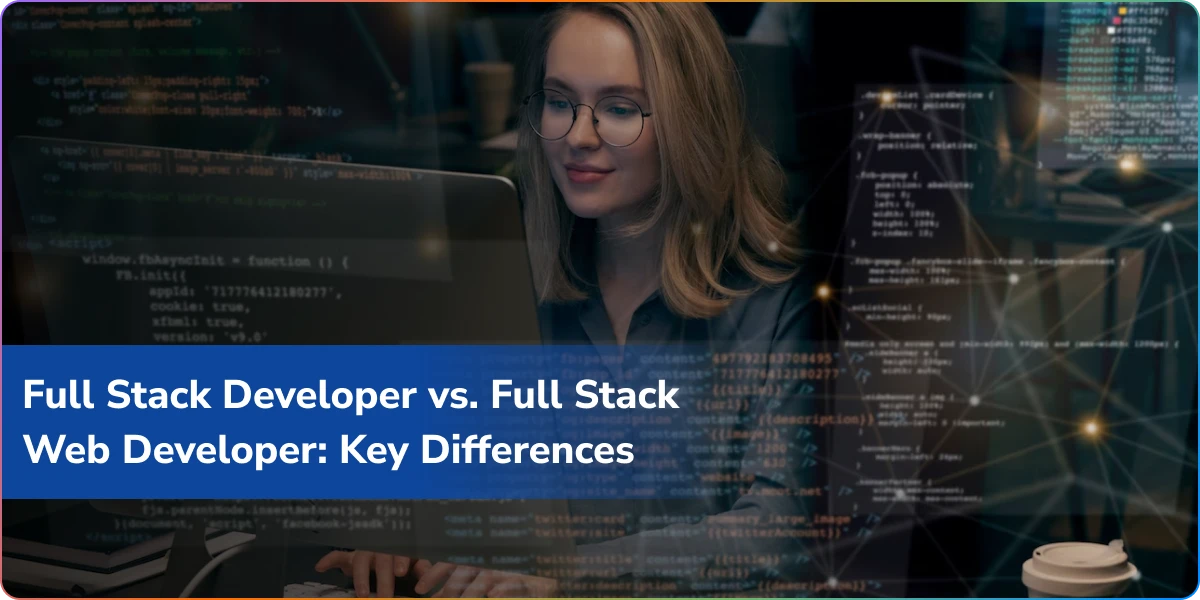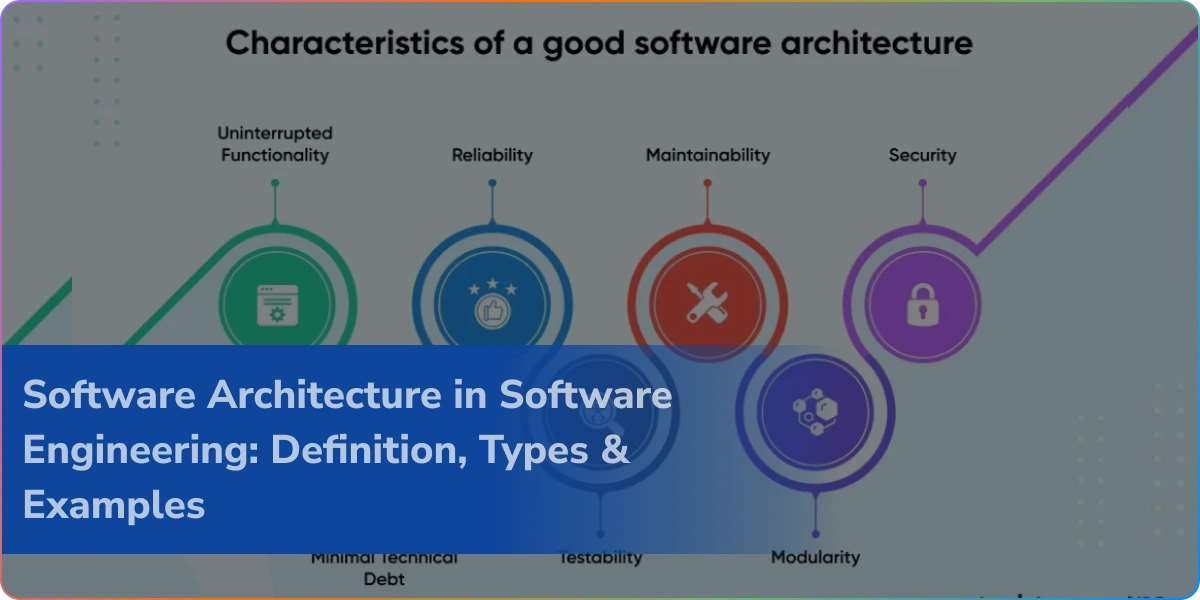In the current rapidly changing world of technology, there’s a diversification of work profiles that cater to upscale productivity with precision. Companies sometimes tend to confuse the minor but significant distinction between such roles and their offering and value for the project. One such confused profile is between a full-stack developer and a full-stack web developer. Although both these jobs sound synonymous and have some overlapping skills, their scope, responsibilities, and technical knowledge may be quite different.
In this in-depth guide, we’ll analyze the main differences between the two positions, discuss their specialized input to the software development cycle, and assist you in deciding which expert to employ for your upcoming technology project.
What Is a Full Stack Developer?
A full-stack developer is a software developer who specializes in both front-end and back-end programming. They are capable of doing everything from designing user interfaces to server-side app logic, databases, APIs, and even DevOps and cloud infrastructure sometimes. In simpler words, a full-stack developer is a one-man army for developing complete applications.
A Java full-stack developer, for instance, is proficient in applying Java technologies to the server-side logic as well as being skilled in front-end technologies like HTML, CSS, JavaScript, and frameworks like Angular or React. Java full-stack development is extremely popular in enterprise settings because of its strength, security, and scalability.
What Is a Full Stack Web Developer?
A full-stack web developer, however, is a subcategory of full-stack developer whose expertise lies only in developing applications that are web-based. Though they do deal with both front-end and back-end development, their field of expertise is web-oriented, and they usually do not develop desktop or mobile applications.
The full-stack web developer is best suited for applications such as e-commerce sites, SaaS solutions, and business interactive portals. They usually develop using HTML, CSS, JavaScript on the client-side and technologies such as PHP, Python, Ruby, or Node.js on the server-side.
Key Differences Between Full Stack Developer and Full Stack Web Developer
| Feature | Full Stack Developer | Full Stack Web Developer |
| Scope | General software development, including web, desktop, and mobile apps | Specializes in web-based applications |
| Backend Technologies | Java, .NET, Python, Node.js, etc. | PHP, Ruby, Node.js, Python |
| Frontend Technologies | React, Angular, Vue.js, etc. | React, Angular, HTML, CSS, JavaScript |
| Platform Focus | Web, mobile, desktop, cloud | Web only |
| Specialization | May include DevOps, cloud services, and system-level software | Focused on UI/UX, responsiveness, and web performance |
| Common Use Case | Enterprise apps, internal tools, system software | Websites, web portals, online dashboards |
Who Is a Java Full Stack Developer?
A Java full-stack developer is a kind of full-stack software developer who is an expert in utilizing Java for the backend. Their areas of expertise are:
- Frontend: HTML, CSS, JavaScript, Angular, React
- Backend: Java, Spring Boot, Hibernate
- Database: MySQL, MongoDB, PostgreSQL
- Tools: Git, Jenkins, Docker
- APIs: RESTful APIs, SOAP
- Java Full Stack Development Projects: Banking applications, CRM systems, ERP tools
Java full-stack development is particularly needed for those projects that involve security, scalability, and performance, such as financial services, healthcare applications, and government platforms.
What is a Full Stack Software Developer Responsible For?
A full-stack software developer is generally responsible for:
- Designing a software structure
- Developing frontend and backend code
- Handling databases
- Deploying applications to cloud platforms such as AWS or Azure
- Securing and optimizing application performance
- Debugging and updating existing code
While full-stack web developers are concerned with only the browser-based experience, full-stack software developers can handle more sophisticated systems such as AI platforms, APIs, native applications, or desktop apps.
Decision between the Two: When to Hire a Full Stack Developer or a Full Stack Web Developer?
A decision between choosing a full-stack developer and hiring a full-stack web developer simply lies in project needs. And this is what to do.
Opt for Full Stack Web Developer if:
- The project is purely web-based (example: website, web application)
- Deliver faster and deploy ASAP are your priorities
- Budget constraints are there, and you also prefer one single developer to accomplish front and backends
- You’re building MVPs, eCommerce stores, or marketing platforms
Opt for a Full Stack Developer if:
- Your application includes sophisticated backend operations or integrations
- You are creating desktop, mobile, or cross-platform software
- You require long-term supportable architecture and long-term maintainability
- The application requires performance enhancement and high-security measures
Skill Comparison Chart
| Skill Area | Java Full Stack Developer | Full Stack Web Developer |
| Backend Language | Java (Spring Boot, Hibernate) | Node.js, PHP, Python |
| Frontend | Angular, React, HTML/CSS | React, Vue, HTML/CSS |
| Database | MySQL, Oracle, MongoDB | MySQL, PostgreSQL |
| Tools | Maven, Jenkins, Git, Docker | Git, Webpack, NPM |
| Deployment | Cloud services, CI/CD pipelines | Web hosting platforms |
| Use Case | Secure enterprise apps | Modern web apps, dashboards |
Advantages of Hiring a Java Full Stack Developer
- Versatility: A full-stack Java developer can create a strong, secure, and scalable application from scratch.
- Performance: Java is renowned for its performance and stability, ideal for high-performance applications.
- Enterprise-Ready: Most corporations favor Java for enterprise applications.
- Strong Community Support: Java programmers have a huge online community, frameworks, and documentation.
When to Hire a Full Stack Developer?
Companies usually tend to hire full-stack developer experts when:
- They want quick development without engaging multiple developers
- Project budgets are low
- The scope of the project is most likely to change in the future
- They’re searching for a single point of responsibility for the whole app
Regardless of whether you’re looking to hire a Java full-stack developer, a full-stack software developer, or a full-stack web developer, the intent should always be alignment with your business goals.
How to Hire Full Stack Developer?
- Define Your Project Scope: Check if your requirement is web-alone or if mobile/desktop is a part of it.
- Evaluate Technical Skills: Check if the applicants are proficient with the tech stack applicable to your project (like Java for the backend).
- Check Portfolio: Try to find genuine examples of the projects the developer has worked on.
- Assess Problem-Solving ability: This skill is important to check in a full-stack developer whether they can think in terms of both frontend experience and backend logic.
- Cultural Fit: A must to look for if you’re considering engaging an employee for a long-term role or remote collaboration.
You can even prefer platforms like LinkedIn, GitHub, and remote work job boards, which are great places to find and hire eligible full-stack developer candidates.
Conclusion
There’s a thin line of difference between a full-stack developer and a full-stack web developer, which needs to be kept in mind before hiring a developer for the project, as their skills can make or break a project with a desired result or delayed and failed output. With our detailed guide, you can surely make a wise choice between the two.
Are you looking to hire full-stack developer and a full-stack web developer for your upcoming project? Look no further and allow us to help you onboard the best developer. A Logixbuilt solution is a leading web and app development company that offers skilled developers who work dedicatedly to deliver expected results. Connect with us today.
FAQ
- What’s the difference between a full-stack developer and a full-stack web developer?
A full-stack developer does both web, mobile, and software, whereas a full-stack web developer deals only in web applications.
- Is a Java full-stack developer different from a normal full-stack developer?
Yes, a Java full-stack developer utilizes Java-based tools throughout the stack, whereas others might work with other technologies.
- What is more suited for business applications?
Java full-stack development is best for advanced business applications, while a full-stack web developer is best suited for less complicated web applications.
- Will a single developer be able to complete a whole project?
Indeed, a quality full-stack software developer can cover small to mid-level projects entirely.
- Why choose Logixbuilt to hire a full-stack developer?
We offer experienced Java full-stack developers and customized teams to develop scalable apps on budget and time.



